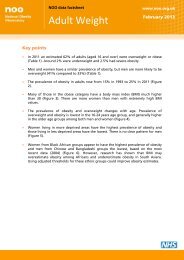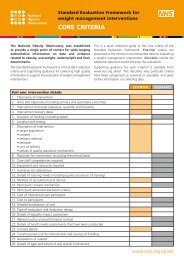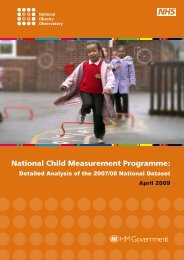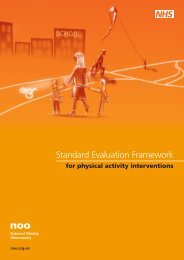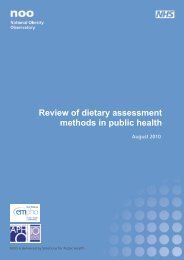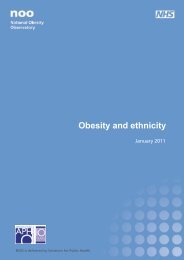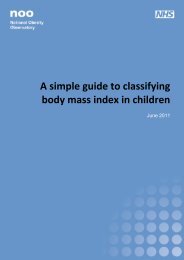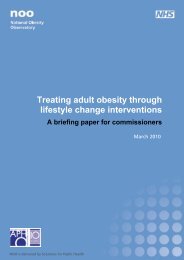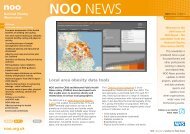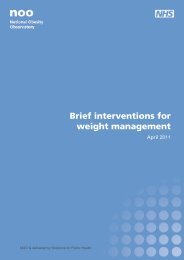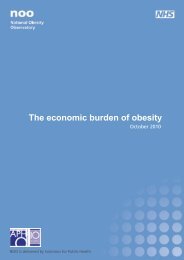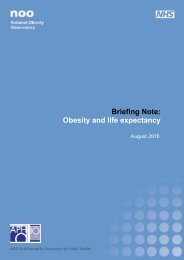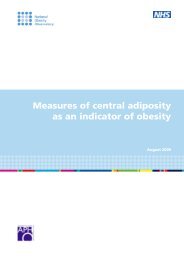Knowledge and attitudes towards healthy eating and physical activity:
Knowledge and attitudes towards healthy eating and physical activity:
Knowledge and attitudes towards healthy eating and physical activity:
You also want an ePaper? Increase the reach of your titles
YUMPU automatically turns print PDFs into web optimized ePapers that Google loves.
Responses to the two surveys varied according to question format. For example, only<br />
6% of respondents mentioned ‘<strong>eating</strong> less sugar’ in the open-ended question from the<br />
LIDNS 2005, compared with over 90% of those provided with a closed-list question in<br />
the HSE 2007. The results may also have been influenced by the different timescales<br />
during which the data were collected. Limiting salt intake was not mentioned in the<br />
LIDNS 2005 survey, but was in the HSE 2007 survey. It is possible the benefits of<br />
reducing salt intake were more widely disseminated by the time the 2007 survey was<br />
carried out.<br />
The British Social Attitudes Survey 2008 (BSAS 2008) reports on adult perceptions of<br />
the quality of information about food <strong>and</strong> <strong>healthy</strong> <strong>eating</strong> for children. Almost 70% of<br />
respondents felt that schools should ensure that children eat healthily <strong>and</strong> exercise.<br />
Over 50% of respondents thought that the government should provide advice for<br />
parents, but only 35% stated that advice currently provided by the government for<br />
parents was useful.<br />
Data from the Target Group Index (TGI) provide information about people’s preferred<br />
source of information on <strong>healthy</strong> lifestyles. The majority of respondents (65%) said<br />
they would prefer to receive such information from their general practitioner or<br />
practice nurse.<br />
ii. Appraisal of own diet<br />
The HSE 2007 asked adults to assess their diet as either ‘very <strong>healthy</strong>’, ‘quite <strong>healthy</strong>’, ‘not<br />
very <strong>healthy</strong>’ or ‘very un<strong>healthy</strong>’. The majority of respondents felt that their diet was ‘quite<br />
<strong>healthy</strong>’ <strong>and</strong> a significantly higher proportion said it was ‘very <strong>healthy</strong>’ than those who said<br />
it was ‘not very <strong>healthy</strong>’. Morbidly obese respondents were significantly less likely to believe<br />
that their diet was ‘very <strong>healthy</strong>’ than those of a <strong>healthy</strong> weight, although none reported that<br />
their diet was ‘very un<strong>healthy</strong>’ (see Appendix 3, Table 1).<br />
In the same survey, 69% of respondents stated that they would like to eat more healthily.<br />
This suggests that although most people believe their diet to be <strong>healthy</strong>, there are still<br />
some aspects that they would like to improve. Those respondents classified as morbidly<br />
obese were significantly more likely to report that they would like to eat more healthily<br />
(81%) than those of a <strong>healthy</strong> weight (69%).<br />
The LIDNS 2005 also reported on the changes respondents would like to make to their own<br />
diet <strong>and</strong> that of their children. The question was open-ended. Eating more fruit <strong>and</strong><br />
vegetables <strong>and</strong> <strong>eating</strong> a healthier diet were the most popular changes that people would<br />
like to make for themselves <strong>and</strong> for their children. Figures 3 <strong>and</strong> 4 show the top ten<br />
changes adults would like to make to their own <strong>and</strong> their children’s diet.<br />
NOO | <strong>Knowledge</strong> <strong>and</strong> <strong>attitudes</strong> <strong>towards</strong> <strong>healthy</strong> <strong>eating</strong> <strong>and</strong> <strong>physical</strong> <strong>activity</strong>: what the data tell us 9



